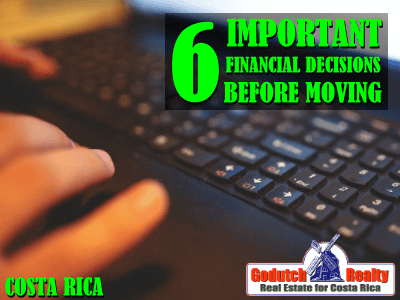 How important are financial decisions before you move? I can’t overemphasize how much potential difficulty and inconvenience you can avoid once you move to Costa Rica. If you’ve attended to your financial details with a customized, flexible transaction plan.
How important are financial decisions before you move? I can’t overemphasize how much potential difficulty and inconvenience you can avoid once you move to Costa Rica. If you’ve attended to your financial details with a customized, flexible transaction plan.
You will need ready access to your assets, so you have to take financial decisions ahead of time. Having money trouble in a foreign country is not a very pleasant prospect. So, don’t procrastinate and leave it to the last minute.
After being In Costa Rica for a number of months, purchasing a car and anticipating a house purchase in our imminent future, I will suggest to you what we recommend in your transaction plan.
Again, I have to caution you to make your financial transaction plan as flexible as possible. It is difficult to anticipate changes in government policies and in the law. But the more options you have, the more likely you will be able to make changes in course direction.
You have 6 financial decisions to make:

1. Bank Wire Transfer
The first of your financial decisions is how to get your money here. Is there the ability to do remote bank wire transfers (and make certain that international capabilities are part of the deal). I mention it first because in some locales it will be the most difficult to achieve.
Wire transfers are another one of those things that every advice website recommends. But this is not based on the “new financial reality” in place at many banks in many states or provinces. Some of you will find remote wire transfers easy to recommend but hard implementing.
You really need this capability to simplify your life while you are here. We found only one bank in our state that offered remote wire transfers with the ability to wire funds to yourself or others while you are physically in a place other than the bank branch. So, this capability may or may not be generally available.
What are you going to do every time you need to get large sums of money down here? You want to hop on an airplane and fly home to visit your bank branch? Try to find some bank or institution that will allow you to set up a transfer of large sums when you are not standing in the branch manager’s office.
2. Credit Card
Find a credit card that doesn’t charge exorbitant currency transfer or conversion fees. You’ll be financially ahead of the game if you have this type of card. We found two, Chase Preferred and Capital One Venture. There may be others, but these are great. They do charge annual membership fee after the first year. But they also give you the option for travel points, miles or cash back. They’re both Visa cards, but every business down here that takes credit cards takes Visa. I thought that getting this out of the way was one of my best financial decisions I made.
3. Debit Card
Get debit (ATM) cards that don’t charge high conversion fees and have a low, flat transaction fee. I think, most financial investment companies offer a VISA or MasterCard debit card that reimburse the transaction service charge at any ATM you use. Get two. It not only adds flexibility but in our case provided a much-needed back up as the snail-mailed initial password for one of our debit cards never arrived and after months and reorders we still don’t have it.
You’ll have to have an account with accessible cash in it. But having an ATM is absolutely a necessity here, especially if you don’t have a bank account. And, with your Costa Rican colones fresh from the ATM in hand you can request your cash discount or “descuento para effectivo” from many stores (i.e. auto parts) and service providers (i.e. mechanics) more than offsetting any ATM service charge (that is, if you don’t have one of the debit cards mentioned above).

4. ETF or ACH Funds
If the bank or institution offers it (not all do) sign up for ETF or ACH funds transfers and add every one of your other banks or financial institutions to the list eligible for you to send and receive funds. This is only good for domestic transactions, not international transfers. This gives you tremendous flexibility and you are going to continue to keep your bank accounts, brokerage, and credit card accounts in the United States or Canada.
5. Bill Payments
Set up bill pay with the banks and investment houses that offer it. It adds to your flexibility for paying individuals and any companies back home that you do not have set up for an automatic monthly charge to your credit card. And, set up credit card auto pay at your bank(s) or investment house(s). This both simplifies and adds flexibility, because you can always go to their secure website and change where a bill gets paid and from which bank your credit card(s) get paid regularly and automatically each month. Using accounting solutions such as Xero or Cloud based quickbooks on a azure wvd server can simply your bill payments and other invoicing needs.
6. Social Security and others
Another of your most important financial decisions is how to keep the money flowing. If you and your spouse are receiving regular monthly Social Security payments, pensions, annuity payments, or other regular income and will need to use these funds to pay for all or part of your living expenses, decide where you want them to be deposited in an institution back home in order to have the funds be most flexible or accessible.

Legal Residency
At the moment, Costa Rica requires ex-pat families with legal residency as a pensionado or rentista to show proof of a minimum of $1,000 monthly income in order to be granted residency. Once you are granted residency, a minimum of $1,000 per month will need to be deposited in your Costa Rican bank account. If you are receiving Social Security or a government pension, it is relatively easy to procure proof and satisfy that $1,000 monthly income requirement. (We went to the U.S. embassy here and got that income certification immediately after we arrived in Costa Rica.)
However, if you are not receiving such income, we have been told by many that satisfying the Costa Rican government of this income requirement can be difficult and time-consuming. Now, there’s something, perhaps, you can be prepared to address before you leave home.
Ready to Roll?
Have you now been able to take some financial decisions? I certainly hope so.
I will cover preparing for and setting up a Costa Rican bank account in a future blog. My next several blogs will be about the place where you live and the “stuff” you’ve crammed into it.
The Author
The author of this blog, Ticonuevo, is a US expat who moved to Costa Rica and used the services of GoDutch Realty to purchase a property in Costa Rica. In his blogs, Ticonuevo describes his own experiences of taking the step of moving to Costa Rica and getting a new life started.
I DO want to remind our readers that we appreciate any referrals you can send us. Also, when talking about your home in Costa Rica, please remember the GoDutch Realty agents. We appreciate it.

























